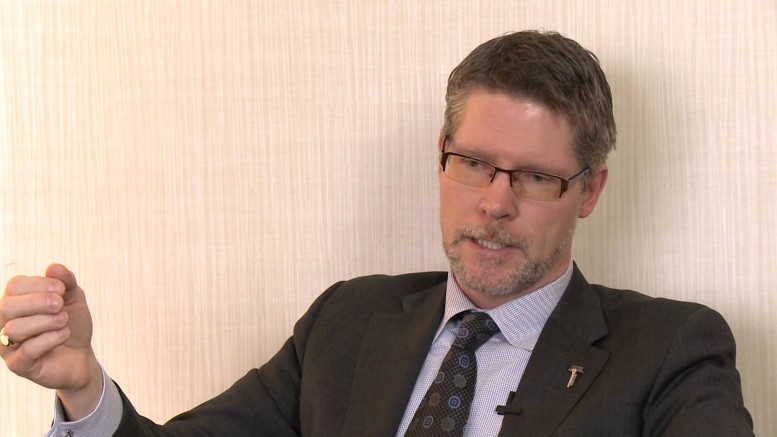VANCOUVER — A policy update put out by the Association for Mineral Exploration British Columbia (AME BC) suggests there’s something amiss in the B.C. junior exploration sector regarding its working relationship with some aboriginal groups in the province.
The organization stated there have been recent occurrences of unspecified First Nation groups approaching exploration companies, along with their contractors and suppliers, demanding up-front payments for accessing permitted work sites on Crown land.
The public update did not disclose any dollar figures, but did state that “the magnitude of the fees demanded can be significant,” and the demands were conveyed under the threat of work interruptions if not provided.
Gavin Dirom, president and CEO of AME BC, tells The Northern Miner during an interview that although he wouldn’t comment on any details, the situation called for the need to “educate and inform the public that such payments are not acceptable or legal practice.
“Though not widespread, demands for payments have been made with no beneficial quid pro quo business benefits,” he says. “Good governance is founded on law and order, and due process — those mechanisms have built our society over the generations. Having clarity on sound and best business practices is important because it aims to produce positive outcomes for everyone involved.”
A large part of AME BC’s mandate is to help bridge relationships between the junior exploration sector and aboriginal groups and other communities in the province. The association, founded in 1912, represents thousands of members who are engaged in mineral exploration and development in B.C. and beyond.
Dirom says that making these concerns of its members public will lead to “trust and respect,” and adds that “we wouldn’t have done this if we never had our members raise it as a concern. We want to be open and transparent about these issues. And it’s important for us and everyone involved to be open to conversation about this, so it can actually create a better understanding and generate positive outcomes for everyone involved.”
According to the update, some First Nations are seeking a fixed percentage of the total exploration program budget from companies, topped with a fixed percentage of gross billing from suppliers or contractors, such as those that provide drilling or helicopter services.
“It is a real and terribly uncomfortable position for an explorer to be in a position where certain parties are trying to coerce them into paying access fees or signing agreements under pressured conditions,” the report states.
Dirom says that the demands also pose a “challenge” for cash-strapped explorers.
“What sometimes gets lost in all this, is that exploration doesn’t generate any revenue for the prospector or junior,” he says. “They’re too busy trying to attract capital to fund their way towards making a discovery, which can then lead to significant revenue flows. And that’s when the most benefits can be shared with the community, including First Nations.”
AME BC turned to John Rustad, the Minister of Aboriginal Relations and Reconciliation of B.C., to seek clarification on the issue, and place it in a context of any potentially relevant anticorruption and public disclosure laws under securities regulations.
The minister responded in a letter: “First Nation assertion of ownership within a geographic area, and associated requests for fees to operate on Crown lands, are not consistent with provincial laws of authority … the province maintains full jurisdiction on Crown lands, and does not view First Nation governments as possessing the authority to require companies to make access payments in return for being allowed to work in their respective territories.”
He stated further that “the province does not support the imposition of revenue-generating processes on Crown lands and for Crown-authorized activities from any third party, and this includes First Nations.”
Dirom says AME BC is pleased the provincial government has provided “clarity about such a sensitive issue,” and by doing so, it “actually reinforces the fact that B.C. has a stable and fair government, and is a safe haven for investment.”
Rustad encourages explorers to “engage with First Nations early and often,” with the objective of establishing good working relationships.
“There are a lot of mutually beneficial agreements that are going on all the time, and they’re making a really positive difference,” Dirom says. “AME BC is fully supportive of the many agreements being implemented and negotiated, and that’s been really positive for many years.”


Be the first to comment on "AME BC: First Nations access fees for explorers ‘not acceptable’"